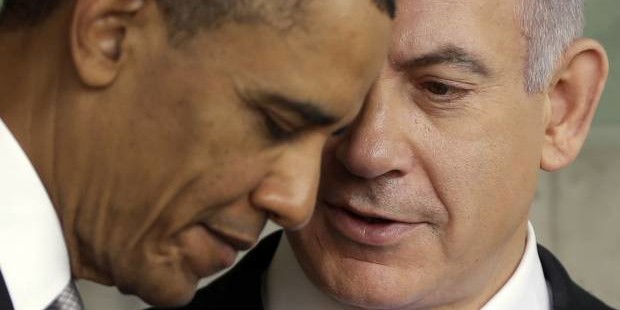
A threat Israel must listen to
New European Union guidelines over the West Bank could force Netanyahu to the table — and lead to real talks
Remember when the U.S. used to call itself “the honest broker” in the Middle East, conjuring the image of blind justice holding scales between the Palestinians and the Israelis? You do not hear this term anymore. The “honest” part has long been too silly to stand, and for three years there has not been anything to broker.
Now there is — well, there may be. Good for Secretary of State John Kerry and his Kissingeresque diplomacy. Home after his sixth trip to the region in just a few months, he might bring Israeli Prime Minister Benjamin Netanyahu and Mahmoud Abbas, the (unelected) Palestinian leader in the West Bank, to the negotiating table. We’ll have to see. But whichever way Kerry’s efforts turn out, they bring the welcome suggestion of motion to the planet’s most intractable political question and one of its grossest humanitarian crises.
Look closely and you do find movement, believe it or not. But ironically enough, this will not come from any bilateral talks, which are supposed to take place in Washington. They are fatally flawed, a sort of diplomatic burlesque, and we will go into that in a minute. No, the prospect of even a modest advance comes from, of all people, those mild-mannered Europeans.
The European Union has made numerous attempts over the years to involve itself in the Israeli–Palestinian issue. Always it let itself be too easily rebuffed, and the Americans remained in charge. This is the source of the paralysis that besets the Mideast. Israel has long had Washington locked up, and long the American media; honest Israelis are pleased to acknowledge this. Hence Washington can do nothing imaginative and not much that is honest. It is as responsible for the failure of Mideast diplomacy as anyone in Israel.
This is why the latest from the E.U. must be watched. Last week, as you may have noted, Brussels announced that it would draft regulations requiring exports (mostly farm products) from the occupied territories to be so labeled. That covers $300 million in sales annually, World Bank economists reckon.
The E.U. will also issue guidelines barring European institutions from funding any Israeli organization—private, public, N.G.O., or what have you — that has operations beyond the Green Line, meaning Israel’s internationally recognized borders before the 1967 war. These new rules are to come into effect next year, when Brussels begins a new five-year budget.
What does this mean? On the economic side, not a great deal. Europeans have a right to know if they are buying products that Israelis are turning out on the West Bank. Emphatically I would want to know. Is this information justly hidden from people? They have no right of refusal? Nonsense. I wager the 6,000 Palestinians working these Israeli farms would want Western consumers to know, too.
But no one is saying anything about the economic side. The significance of the E.U.’s move is larger and lies elsewhere.
“This is not about money,” a dweller in a Brussels think tank told the New York Times after the E.U.’s announcement. “It’s about politics.” There is only one way to put it more plainly. It’s about good politics.
The Europeans are simply taking cognizance of international law, nothing more. The Israeli settlements in the West Bank are illegal. This is not a matter in dispute. And Brussels is not acting all that forcefully. By any decent interpretation of law, the products in question should not be labeled; they are simply contraband.
But even in its weak voice, Europe has said something that bears weight: We hold Israel to its recognized, pre–1967 borders. This is what is important. This is what brings the faint prospect of movement. You do not hear this kind of thing from the honest broker, which does not (and truly cannot for the political reasons noted above) hold Israel responsible to the law.
The Netanyahu government pretended to be shocked by the word from Brussels. Of course it knew of these regulations well, well in advance, but shocked was the suitable pose. With the departure of Mahmoud Ahmadinejad from the Iranian presidency, Netanyahu can now be counted the most dangerous man in the Middle East. It is good to read (in the Financial Times) that he was instantly on the telephone to Brussels, “pleading” (the FT’s word) for a postponement of the new rules. You do not much get to see Bibi pleading when he talks to Washington.

